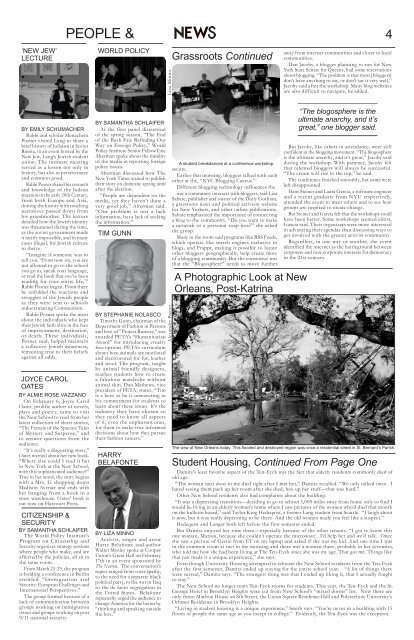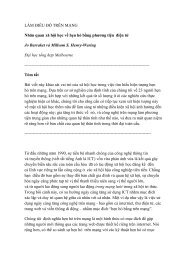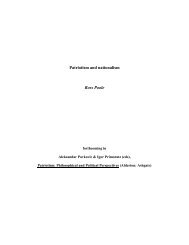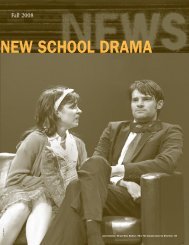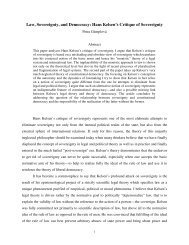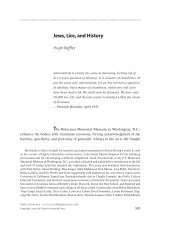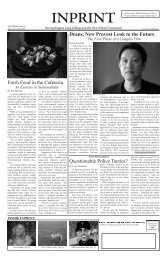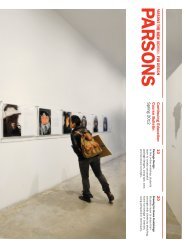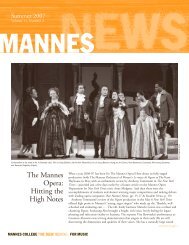RESIDING ELSEWHERE - The New School
RESIDING ELSEWHERE - The New School
RESIDING ELSEWHERE - The New School
You also want an ePaper? Increase the reach of your titles
YUMPU automatically turns print PDFs into web optimized ePapers that Google loves.
‘neW JeW’<br />
Lecture<br />
By emiLy scHumAcHer<br />
Rabbi and scholar Menachem<br />
Posner visited Lang to share a<br />
brief history of Judaism in Soviet<br />
Russia, in an event hosted by the<br />
<strong>New</strong> Jew, Lang’s Jewish student<br />
union. <strong>The</strong> intimate meeting<br />
served as a lesson not only in<br />
history, but also in perseverance<br />
and common good.<br />
Rabbi Posner shared his research<br />
and knowledge of the Judean<br />
situation in the early 20th Century,<br />
from both Europe and Asia,<br />
dotting the history with touching<br />
narratives passed down from<br />
his grandmother. <strong>The</strong> lecture<br />
detailed how the Jewish identity<br />
was threatened during the time,<br />
as the soviet government made<br />
it nearly impossible, and in many<br />
cases illegal, for Jewish culture<br />
to thrive.<br />
“Imagine if someone was to<br />
tell you, ‘From now on, you are<br />
not allowed to go to the school<br />
you go to, speak your language,<br />
or read the book that you’ve been<br />
reading for your entire life,’”<br />
Rabbi Posner began. From there<br />
he unfolded the reactions and<br />
struggles of the Jewish people<br />
as they were sent to schools<br />
indoctrinating Communism.<br />
Rabbi Posner spoke the most<br />
about the individuals who kept<br />
their Jewish faith alive in the face<br />
of imprisonment, destitution,<br />
or death. <strong>The</strong>se individuals,<br />
Posner said, helped maintain<br />
a collective Jewish awareness,<br />
remaining true to their beliefs<br />
against all odds.<br />
JOyce cArOL<br />
OAtes<br />
By ALmie rOse vAzzAnO<br />
On February 6, Joyce Carol<br />
Oates, prolific author of novels,<br />
plays and poetry, came to visit<br />
the <strong>New</strong> <strong>School</strong> to read from her<br />
latest collection of short stories,<br />
“<strong>The</strong> Female of the Species: Tales<br />
of Mystery and Suspense,” and<br />
to answer questions from the<br />
audience.<br />
“It’s really a disgusting story,”<br />
Oates warned about her new book.<br />
“Where else could I read it but<br />
in <strong>New</strong> York at the <strong>New</strong> <strong>School</strong>,<br />
with this sophisticated audience?”<br />
True to her word, the story begins<br />
with a Mrs. G shopping down<br />
Madison Avenue and ends with<br />
her hanging from a hook in a<br />
store warehouse. Oates’ book is<br />
out now on Harcourt Press.<br />
citizensHiP &<br />
security<br />
By sAmAntHA scHLAifer<br />
<strong>The</strong> World Policy Institute’s<br />
Program on Citizenship and<br />
Security organizes strategy sessions<br />
where people who make, and are<br />
affected by the policies, all sit in<br />
the same room.<br />
From March 23-25, the program<br />
is holding a conference in Berlin<br />
entitled “Immigration and<br />
Security: European Challenges and<br />
International Perspectives.”<br />
<strong>The</strong> group formed because of a<br />
lack of communication between<br />
groups working on immigration<br />
issues and groups working on post<br />
9/11 national security.<br />
PeOPLe &<br />
WOrLd POLicy<br />
By sAmAntHA scHLAifer<br />
At the first panel discussion<br />
of the spring season, “<strong>The</strong> End<br />
of the Bush Era: Refinding Our<br />
Way on Foreign Policy,” World<br />
Policy Institute Senior Fellow Eric<br />
Alterman spoke about the timidity<br />
of the media in reporting foreign<br />
policy issues.<br />
Alterman discussed how <strong>The</strong><br />
<strong>New</strong> York Times waited to publish<br />
their story on domestic spying until<br />
after the election.<br />
“People are dependent on the<br />
media, yet they haven’t done a<br />
very good job,” Alterman said.<br />
“Our problem is not a lack<br />
information, but a lack of seeking<br />
the information.”<br />
tim Gunn<br />
By stePHAnie nOLAscO<br />
Timothy Gunn, chairman of the<br />
Department of Fashion in Parsons<br />
and host of “Project Runway,” was<br />
awarded PETA’s “Humanitarian<br />
Award” for introducing cruelty<br />
free options. PETA’s curriculum<br />
shows how animals are mutilated<br />
and electrocuted for fur, leather<br />
and wool. <strong>The</strong> program, taught<br />
by animal friendly designers,<br />
teaches students how to create<br />
a fabulous wardrobe without<br />
animal skin. Dan Mathews, vice<br />
president of PETA, states, “Tim<br />
is a hero as he is unwavering in<br />
his commitment for students to<br />
learn about these issues. It’s the<br />
industry they have chosen so<br />
they need to know all aspects<br />
of it, even the unpleasant ones,<br />
for them to make true informed<br />
decisions about how they pursue<br />
their fashion careers.”<br />
HArry<br />
BeLAfOnte<br />
By LizA minnO<br />
Activist, singer and actor<br />
Harry Belafonte and author<br />
Walter Mosley spoke at Cooper<br />
Union’s Great Hall on February<br />
17th in an event sponsored by<br />
<strong>The</strong> Nation. <strong>The</strong> conversation’s<br />
topics ranged from voter apathy,<br />
to the need for a separate black<br />
political party, to the war in Iraq<br />
to the de facto segregation in<br />
the United States. Belafonte<br />
repeatedly urged the audience to<br />
change America for the better by<br />
“thinking and speaking outside<br />
the box.”<br />
Liza Minno<br />
Alexander Porter<br />
Grassroots Continued<br />
A student breakdances at a conference workshop.<br />
secure.<br />
Earlier that morning, bloggers talked with each<br />
other at the, “NYC Blogging Caucus.”<br />
Different blogging technology influences the<br />
way a community interacts with bloggers, said Liza<br />
Sabate, publisher and owner of the Daily Gotham,<br />
a grassroots news and political activism website<br />
for <strong>New</strong> Yorkers, and other online publications.<br />
Sabate emphasized the importance of connecting<br />
a blog to the community. “Do you want to make<br />
a network or a personal soap-box?” she asked<br />
the group.<br />
Many in the room said programs like RSS Feeds,<br />
which operate like search engines exclusive to<br />
blogs, and Frappr, making it possible to locate<br />
other bloggers geographically, help create more<br />
of a blogging community. But the consensus was<br />
that the “Blogosphere” needs to move further<br />
A Photographic Look at new<br />
Orleans, Post-Katrina<br />
away from internet communities and closer to local<br />
communities.<br />
Dan Jacoby, a blogger planning to run for <strong>New</strong><br />
York State Senate for Queens, had some reservations<br />
about blogging. “<strong>The</strong> problem is that most [bloggers]<br />
don’t have anything to say, or don’t say it very well,”<br />
Jacoby said after the workshop. Many blog websites<br />
are also difficult to navigate, he added.<br />
“<strong>The</strong> blogosphere is the<br />
ultimate anarchy, and it’s<br />
great,” one blogger said.<br />
But Jacoby, like others in attendance, were still<br />
confident in the blogging movement. “<strong>The</strong> blogosphere<br />
is the ultimate anarchy, and it’s great,” Jacoby said<br />
during the workshop. With patience, Jacoby felt<br />
that talented bloggers will always be successful.<br />
“<strong>The</strong> cream will rise to the top,” he said.<br />
<strong>The</strong> conference finished smoothly, but some were<br />
left disappointed.<br />
Hans Steiner and Laura Garcia, a software engineer<br />
and a recent graduate from NYU respectively,<br />
attended the event to meet others and to see how<br />
groups are inspired to create change.<br />
But Steiner and Garcia felt that the workshops could<br />
have been better. Some workshops seemed elitist,<br />
Garcia said. <strong>The</strong>ir organizers were more interested<br />
in advancing their agendas than discussing ways to<br />
get involved with the greater activist community.<br />
Regardless, in one way or another, the event<br />
identified the internet as the battleground between<br />
corporate and non-corporate interests for democracy<br />
in the 21st century.<br />
<strong>The</strong> view of <strong>New</strong> Orleans today: This flooded and destroyed region was once a residential street in St. Bernard’s Parish.<br />
student Housing, Continued from page one<br />
Damitz’s least favorite aspect of the Ten-Eyck was the fact that elderly residents commonly died of<br />
old age.<br />
“<strong>The</strong> woman next door to me died right after I met her,” Damitz recalled. “We only talked once. I<br />
hated seeing them pack up her room after she died, box up her stuff—that was hard.”<br />
Other <strong>New</strong> <strong>School</strong> residents also had complaints about the building.<br />
“It was a depressing transition—deciding to go to school 3,000 miles away from home only to find I<br />
would be living in an elderly woman’s home where I saw pictures of the women who’d died that month<br />
on the bulletin board,” said Taylor King Hedequist, a former Lang student from Seattle. “I laugh about<br />
it now, but it was really depressing to be there. And the old women made you feel like a suspect.”<br />
Hedequist and Langer both left before the first semester ended.<br />
But Damitz enjoyed her time there—especially because of the other tenants. “I got to know this<br />
one woman, Marion, because she couldn’t operate the microwave. I’d help her and we’d talk. Once<br />
she saw a picture of Gertie from ET on my laptop and asked if she was my kid. And one time I was<br />
in the common room at two in the morning and there was a woman there, probably in her seventies,<br />
who told me how she had been living at <strong>The</strong> Ten-Eyck since she was my age. That got me. Things like<br />
that just made it a unique experience,” she says.<br />
Even though University Housing attempted to relocate the <strong>New</strong> <strong>School</strong> residents from the Ten-Eyck<br />
after the first semester, Damitz ended up staying for the entire school year. “A lot of things there<br />
were surreal,” Damitz says. “<strong>The</strong> strangest thing was that I ended up liking it, that I actually fought<br />
to stay.”<br />
<strong>The</strong> <strong>New</strong> <strong>School</strong> no longer rents Ten-Eyck rooms for students. This year, the Ten-Eyck and the St.<br />
George Hotel in Brooklyn Heights were cut from <strong>New</strong> <strong>School</strong>’s “mixed dorms” list. Now there are<br />
only three: Marlton House on 8th Street, the Union Square Residence Hall and Polytechnic University’s<br />
Othmer Residence in Brooklyn Heights.<br />
“Living in student housing is a unique experience,” Smith says. “You’re never in a building with 15<br />
floors of people the same age as you except in college.” Evidently, the Ten-Eyck was the exception.


